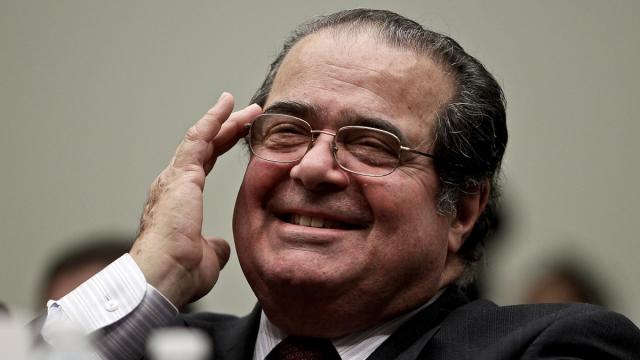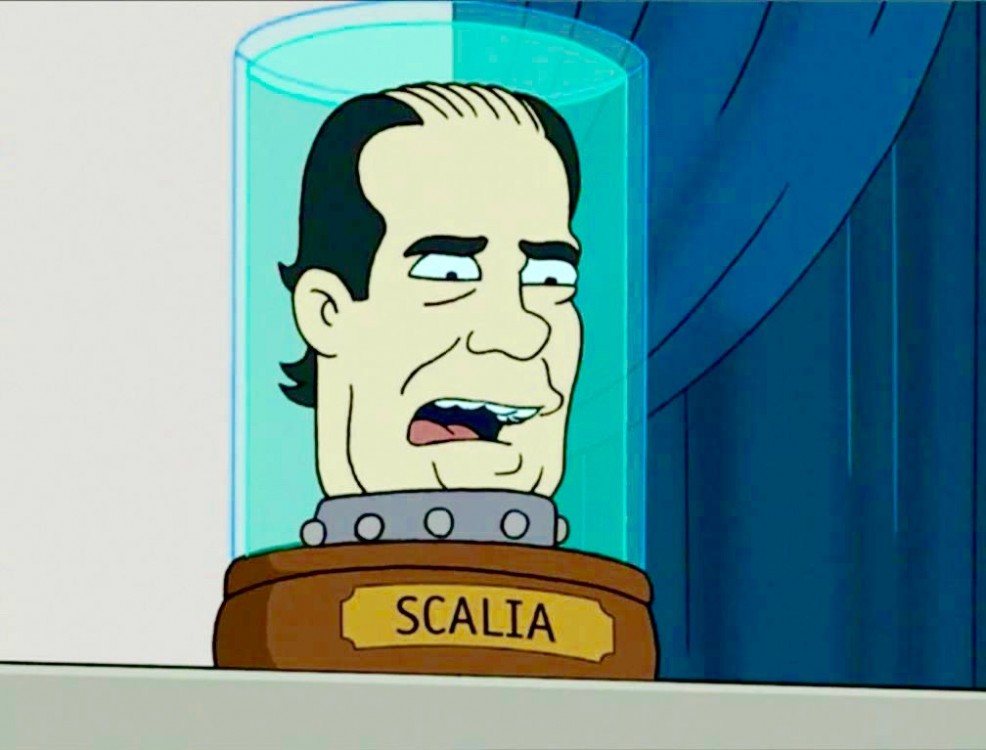
Justice Antonin Scalia had an impressive career. In his decades-long appointment as a Supreme Court Justice, he has worked diligently against the forces of social justice. Scalia’s insane originalist philosophy has had a major impact on modern conservatism. Luckily, President Obama will now have the opportunity to appoint a new Supreme Court Justice, which will tip the scales in favor of a liberal court.
Here is a look back on ten of the worst Supreme Court Decisions of Scalia’s career. Sometimes his opinions were in the majority. The ones that were in dissent were oftentimes vicious.
In Bush v. Gore, the Supreme Court decided to stop recounting ballots in Florida. This decision is considered by many to be the reason George W. Bush became the president, with everything that came after. Scalia voted in concurrence with majority, and wrote:
“The issue is not, as the dissent puts it, whether “[c]ounting every legally cast vote ca[n] constitute irreparable harm.” One of the principal issues in the appeal we have accepted is precisely whether the votes that have been ordered to be counted are, under a reasonable interpretation of Florida law, “legally cast vote[s].” The counting of votes that are of questionable legality does in my view threaten irreparable harm to petitioner, and to the country, by casting a cloud upon what he claims to be the legitimacy of his election. Count first, and rule upon legality afterwards, is not a recipe for producing election results that have the public acceptance democratic stability requires.”
2. Citizens United v. Federal Election Commission, 2010
In Citizens United v. Federal Election Commission, the Supreme Court decided that corporations are people. This created the situation we are in now, where corporations can donate unlimited amounts of money to SuperPACS, which are used to influence political elections. Scalia voted in concurrence with the majority, and wrote:
“Even if we thought it proper to apply the dissent’s approach of excluding from First Amendment coverage what the Founders disliked, and even if we agreed that the Founders disliked founding-era corporations; modern corporations might not qualify for exclusion. Most of the Founders’ resentment towards corporations was directed at the state-granted monopoly privileges that individually chartered corporations enjoyed. Modern corporations do not have such privileges, and would probably have been favored by most of our enterprising Founders—excluding, perhaps, Thomas Jefferson and others favoring perpetuation of an agrarian society.”
3. Burwell v. Hobby Lobby, 2014
In Burwell v. Hobby Lobby, the Supreme Court decided that private businesses can be exempted from certain laws on religious grounds. Justice Scalia voted with the opinion of the court. During the case’s oral argument, Scalia said:
“Well, religious beliefs aren’t reasonable. I mean, religious beliefs are categorical. You know, it’s God tells you. It’s not a matter of being reasonable. God be reasonable? He’s supposed to have a full beard.”
4. King v. Burwell, 2015
In King v. Burwell, the Supreme Court decided that subsidies under Obamacare could be used through the federal exchange program. Scalia dissented, saying:
“We should start calling this law SCOTUScare … [T]his Court’s two decisions on the Act will surely be remembered through the years … And the cases will publish forever the discouraging truth that the Supreme Court of the United States favors some laws over others, and is prepared to do whatever it takes to uphold and assist its favorites.”
5. Shelby County v. Holder, 2013
In Shelby County v. Holder, the Supreme Court decided to strike down parts of the Voting Rights Act of 1965. This weakened the Voting Rights Act and is considered by many an attack on the civil liberties of black voters. Scalia said, in 2013 in a speech at the University of California Washington Center, the following:
“Whenever a society adopts racial entitlements, it is very difficult to get out of them through the normal political processes. Even the name of it is wonderful, the Voting Rights Act. Who’s going to vote against that?”
6. Obergefell v. Hodges, 2015
In Obergrefell v. Hodges, the Supreme Court decided that same-sex couples have the right to get married. Scalia dissented from the opinion of the court, saying:
“Those civil consequences—and the public approval that conferring the name of marriage evidences—can perhaps have adverse social effects, but no more adverse than the effects of many other controversial laws. So it is not of special importance to me what the law says about marriage. It is of overwhelming importance, however, who it is that rules me. Today’s decree says that my Ruler, and the Ruler of 320 million Americans coast-to-coast, is a majority of the nine lawyers on the Supreme Court.”
7. Planned Parenthood v. Casey, 1992
In Planned Parenthood v. Casey, challenges were made to Pennsylvania law that required women to meet certain provisions in order to have an abortion. The court found that the provisions were unconstitutional, except for one that required women to notify their husband. Justice Scalia dissented gainst the opinion of the court, saying:
“The States may, if they wish, permit abortion on demand, but the Constitution does not require them to do so. The permissibility of abortion, and the limitations upon it, are to be resolved like most important questions in our democracy: by citizens trying to persuade one another and then voting.”
8. Lawrence v. Texas, 2003
In this Supreme Court decision, a law that banned sodomy was struck down. Scalia dissented from the opinion of the court. He wrote:
“Many Americans do not want persons who openly engage in homosexual conduct as partners in their business, as scoutmasters for their children, as teachers in their children’s schools, or as boarders in their home,” he wrote. “They view this as protecting themselves and their families from a lifestyle that they believe to be immoral and destructive.”
9. Romer v. Evans, 1996
In Romer v. Evans, the Supreme Court decided that the state of Colorado could not prevent local jurisdictions from creating laws that prohibit discrimination against LGBT people, Scalia dissented, saying:
“[Colorado’s ban] prohibits special treatment of homosexuals, and nothing more. [I]t would prevent the State or any municipality from making death benefit payments to the ‘life partner’ of a homosexual when it does not make such payments to the long time roommate of a nonhomosexual employee.”
10. Wal-Mart v. Dukes, 2011
In Wal-Mart v. Dukes, the Supreme court made the decision that ended one of the largest class-action suits in history. More than 1.5 million women filed a class action suit against Wal-Mart claiming gender discrimination. Scalia voted with the majority of the court and delivered their opinion. Scalia said:
“Respondents have not identified a common mode of exercising discretion that pervades the entire company—aside from their reliance on Dr. Bielby’s social frameworks analysis that we have rejected. In a company of Wal-Mart’s size and geographical scope, it is quite unbelievable that all managers would exercise their discretion in a common way without some common direction. Respondents attempt to make that showing by means of statistical and anecdotal evidence, but their evidence falls well short.”
Republicans are already hard at work trying to prevent President Obama from appointing Scalia’s replacement. Their efforts are in vain. There is no legitimate reason President Obama should not appoint Scalia’s replacement. Luckily for everyone, it is likely that President Obama’s replacement can undo much of the harm that Scalia has done during his career.
3 WAYS TO SHOW YOUR SUPPORT
- Log in to post comments














